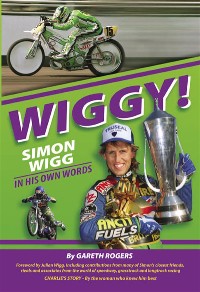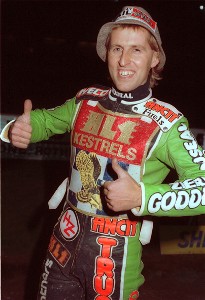
| |||||||
| |||||||
|
|
Book Extract: Wiggy!
The following extract consists entirely of Simon's words and covers the 1987 season he spent with Hackney. CAPITAL LOSSES I'd had no problems whatsoever at Oxford for three years and then one day, Kevin Hedderley, one of the financial management team of owners Northern Sports, confronted me with a proposed pay cut for the 1987 season. Having been a World Champion, and brought a lot of profile to Oxford and its stadium, which I felt they never exploited at all, I felt quite bitter about being asked to race for less money. A move to Hackney was mooted after Oxford told me that they couldn't afford to pay me what they had in 1986, so what I did that winter was go out and find a good sponsor. In Australia I met John Old, who was coming to Britain to start the Trueseal business here and had been looking for a way of marketing his product in the UK. When I told him that I was struggling to do a deal at Oxford, he asked me what I could do for him if he put money up on the sponsorship front. I told him that there was a new team entering the British League and that Oxford might be looking at letting me out on loan. The track was in London and they wanted me as their number one. John stated that if I moved to Hackney he would make up the difference between what they could afford to pay me and my 1986 deal I had at Oxford. It was a good solution for all concerned and I was happy knowing I was going to earn my normal rate, even though it meant a little extra work for me in promoting the Trueseal name and products. The whole business frustrated me, though, as I didn't think that Oxford were doing enough to put bums on seats. They were relying on the team's success as their only way of attracting crowds but there was so much more that could've been done on the promotion and marketing side. I thought that if more effort went in to increase attendances in the first place, I wouldn't have been asked to take a pay cut. In the three previous seasons I had agreed a deal with Bernard Crapper and John Payne and had always been able to talk to them. Then Kevin Hedderley came along and he couldn't understand my way of thinking. I couldn't understand his, so there was a big breakdown in communication there really. I would have much rather continued at Oxford on the same deal in 1987 but it didn't happen. It is very hard to drop your standards when you have set your budget and you are an organised professional. If your planning is all set to a certain standard and someone asks you to do the same job for less money, it becomes very hard. Whatever business you are in, it's difficult to suddenly find ways of cutting your costs. At the same time as trying to win races and score points for your team, you are also expected to look good and turn out professionally, to have clean and tidy mechanics, to drive reliable, quality vehicles - in fact all the trappings you would imagine that a speedway organiser would want you to have. That was a very difficult situation for me to accept but, luckily, it was solved through John Old and the Trueseal Group, whom I'd met at the Mister Melbourne event, which they sponsored and I managed to win. Seeing me as an interesting way to help put across their message in Europe, they made up the shortfall on what Hackney could afford and I signed for the east London club, who were returning to the top flight after having spent three previous successful seasons in the National League.
It could have been a good career move but the one issue that always made it very difficult for me to immerse myself into the Hackney scene was the fact that I was only there on loan from Oxford. I was still owned by Oxford and I really hated that. Although a situation like that probably doesn't bother a lot of riders, I like to feel part of the furniture, as if I truly belong somewhere. But if you think that you may only be spending just a year at a club, which is the basis of every loan agreement, it is difficult to become totally involved with that team. This also applied in 1990 when I went to Bradford. In both situations, I wanted to be bought from Oxford. The other problem to me was that the Hackney track changed. It had been a fabulous track but they decided to bring the fence in - as I recall, for safety reasons to keep the Control Board happy. The trouble was that bringing the fence in drastically reduced the racing line and restricted a rider's ability to get alongside other riders entering the corners. This made it particularly frustrating if you were at the back, so it was very hard to ride the track fast unless you were in front. It was very difficult to get past anybody on the reshaped track. The Hackney track was also very slick, much slicker than I had imagined it would be on a regular basis. When they did try and put any dirt down, it always became very patchy. I found that very hard to understand having been at Oxford, where Barry and John had spoilt the home riders rotten. Oxford was the best track in the country at the time, prepared by the two very best track guys, using the most expensive material that they could get their hands on. That's how it should be. When I ride in a motorcycle meeting, I'm expected to turn out with the best bikes and the best equipment possible, so by the same token, I expect track preparation to be done the same way. The paying public are the ones who pay the biggest price if the product is not right. They always vote with their feet. If you are trying to get bums on seats, one would automatically think that the most important issue, first and foremost, would be good track preparation. But after what I'd been used to at Oxford, I found it difficult adapting to the Hackney circuit. Also, the alterations they'd made that winter, by reducing the width and bringing the fence in two metres all the way around, only added to my dissatisfaction. I'm not trying to make excuses for any performances but it was very difficult to become excited about going there towards the end of the season. It was also a pity that their season back in the British League was to prove a one-off, with the promotion unable to sustain the financial realities of life in the top flight. The potential of racing in London was enormous and I know that everyone involved in the management - John Louis, Dave Pavitt and Mike Western - all tried very hard to make it work. I must also accept that there may have been a number of circumstances, of which I am unaware, that made it difficult for them to do what they set out to in the British League. The Kestrels team was certainly full of exciting potential. Mark Loram was a young reserve at the age of 16 and nothing made me happier than leading such a youthful Hackney team to Oxford towards the end of the season - and winning! There was a view put forward from some quarters that Hackney returned to the National League in 1988 because I was an expense they simply couldn't afford. I know what I rode for and I know, too, that my main sponsor, Trueseal, paid a lot of it. It's a load of old rubbish for anyone to say that I was too expensive for Hackney, for Trueseal were subsidising my deal quite considerably. In fact, I probably rode for 20 per cent less at Waterden Road that season than I've ever done elsewhere. It was true that Hackney's crowds weren't particularly healthy, although I didn't see how attendances there could be sufficient when the racing wasn't as good as it needed to be to maintain the public's interest. It's difficult to point the finger. It just didn't quite work well enough for John, Dave and Mike to want to go again in the British League in 1988. Instead, they dropped a division and won the National League that season - and no wonder. Riders like Loram and Andy Galvin, who had ridden very well when I had been there in the senior league, were absolutely flying at NL level. By Gareth Rogers Edited by Tony McDonald
Published November 2005, £15.99, in softback Order your copy at www.retro-speedway.com
This article was first published on 9th December 2005
"I was only 21 when I raced in England and got to see a lot of my heroes from the speedway star I received each week. I had grown up reading about these gods and was certainly overawed by one when seen in person. I first saw Simon Wigg when he came to watch at Milton Keynes { 1989 } where I was the junior captain. I couldn't believe how approachable he was and that he made time to talk to me, remember I thought they were all film stars, but Simon not only became an aquanitance but for the remaining 3 years I was there a very close freind. He was a legend in the true sense and I shed a tear as did many when he passed away so young. Many people suffer egoitis when successful but Simon was not one...A TRUE CHAMPION, HUSBAND, FATHER AND MATE................as often said 'gone but most definately not forgotten'"
|
||||||
| Please leave your comments on this article (email address will not be published) | |||||||




